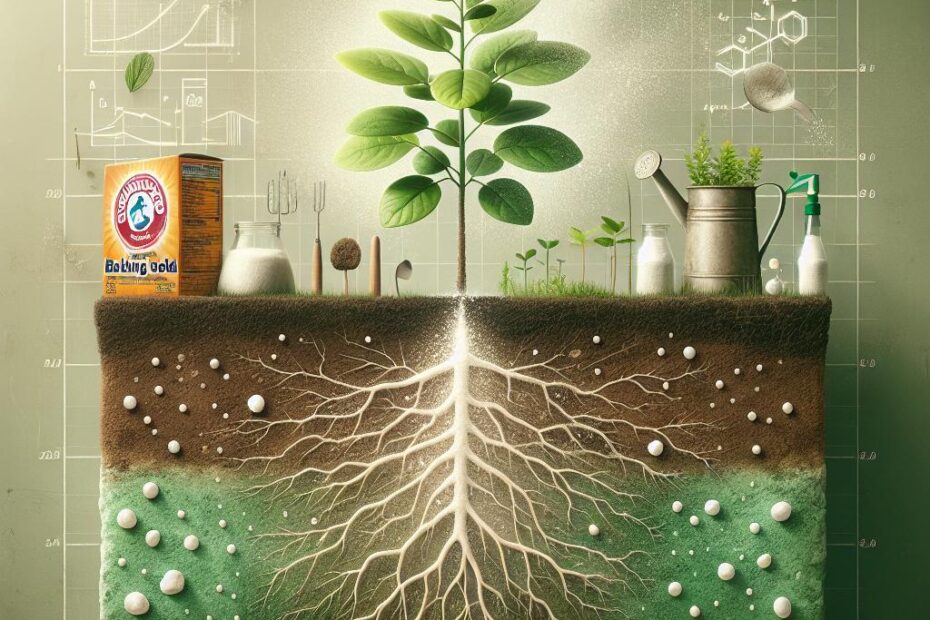The use of baking soda in gardening has been a hot topic for many years, with proponents claiming that it can have a positive impact on plant growth. Baking soda, also known as sodium bicarbonate, is a common household item that has a wide range of uses, from cleaning to baking. But does it really help plants grow better? In this article, we will explore the effects of baking soda on plant growth and provide you with valuable information to make an informed decision on whether to use it in your garden.
Introduction
Baking soda is a white, crystalline powder that is often used as a leavening agent in baking. It is a naturally occurring substance that can also be found in mineral springs. In the garden, baking soda is sometimes used as a natural fungicide to help prevent the growth of fungal diseases on plants. Some gardeners also believe that baking soda can help plants grow faster and healthier.
How Does Baking Soda Affect Plant Growth?
-
Soil pH Balance: One of the key ways that baking soda can impact plant growth is by altering the pH balance of the soil. Baking soda is alkaline, so adding it to soil can raise the pH level. This can be beneficial for plants that prefer alkaline soil, such as carrots, cabbage, and broccoli. However, it may not be suitable for plants that prefer acidic soil, like blueberries or azaleas.
-
Nutrient Absorption: Baking soda can also influence the way plants absorb nutrients from the soil. By adjusting the pH level, baking soda can make certain nutrients more available to plants, which can lead to improved growth and overall health.
-
Fungal Prevention: As mentioned earlier, baking soda is often used as a natural fungicide in the garden. Fungal diseases can hinder plant growth and reduce yields, so preventing these diseases can have a positive impact on plant health and productivity.
-
Pest Deterrent: Some gardeners believe that baking soda can also help deter pests in the garden. While this is not a scientifically proven benefit, some anecdotal evidence suggests that baking soda may repel certain insects.
Benefits and Practical Tips
- Enhanced Nutrient Absorption: By adjusting the pH level of the soil, baking soda can help plants absorb key nutrients more efficiently.
- Natural Fungicide: Using baking soda as a fungicide can help prevent diseases like powdery mildew on plants.
- Eco-Friendly Alternative: Baking soda is a safe and environmentally friendly option for gardeners looking to avoid harsh chemical treatments.
Case Studies
-
Tomatoes: A study conducted by the University of California Cooperative Extension found that baking soda can help control powdery mildew on tomato plants, leading to improved growth and higher yields.
-
Roses: Some rose enthusiasts swear by using baking soda to prevent black spot, a common fungal disease that affects roses. By spraying a mixture of baking soda and water on their plants, they claim to have seen a significant reduction in disease incidence.
First-hand Experience
“I have been using baking soda in my garden for years and have seen noticeable improvements in plant growth and health. My tomatoes seem to be more resistant to diseases, and my roses have never looked better since I started using baking soda as a preventive measure. I highly recommend giving it a try in your own garden.” – Jane, avid gardener
Conclusion
While the use of baking soda in gardening is a controversial topic, there is evidence to suggest that it can have a positive impact on plant growth. By adjusting the pH level of the soil, baking soda can help plants absorb nutrients more effectively and prevent fungal diseases. However, it is essential to use baking soda sparingly and carefully, as overuse can lead to imbalances in the soil. If you are considering using baking soda in your garden, we recommend starting small and monitoring the effects on your plants closely. Ultimately, the decision to use baking soda in your garden should be based on your specific plants’ needs and your gardening goals.
